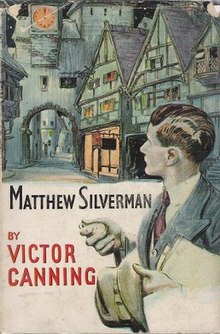
The Times is a British daily national newspaper based in London. It began in 1785 under the title The Daily Universal Register, adopting its current name on 1 January 1788. The Times and its sister paper The Sunday Times are published by Times Newspapers, since 1981 a subsidiary of News UK, in turn wholly owned by News Corp. The Times and The Sunday Times, which do not share editorial staff, were founded independently, and have only had common ownership since 1966. In general, the political position of The Times is considered to be centre-right.
Victor Canning was a prolific British writer of novels and thrillers who flourished in the 1950s, 1960s and 1970s. He was personally reticent, writing no memoirs and giving relatively few newspaper interviews.
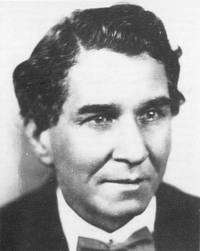
Matthew Phipps Shiell, known as M. P. Shiel, was a British writer. His legal surname remained "Shiell" though he adopted the shorter version as a de facto pen name.

Harry Stephen Keeler was a prolific but little-known American fiction writer, who developed a cult following for his eccentric mysteries. He also wrote science fiction.

Matthew James Higgins was a British writer who used the nom-de-plumeJacob Omnium, which was the title of his first magazine article. He was born in County Meath, Ireland to a landed family. He owned an estate in British Guiana, which he visited twice.
Colin Higgins was an Australian-American screenwriter, actor, director, and producer. He was best known for writing the screenplay for the 1971 film Harold and Maude, and for directing the films Foul Play (1978) and 9 to 5 (1980).

Farmers Guardian is a weekly newspaper aimed at the British farming industry. It provides comprehensive and topical news with Livestock, Arable and Machinery sections; as well as business information and latest market prices. It is sold nationally and is published each Friday. Based in Preston, Lancashire, it was for many years owned by United Business Media but it, and sister title Pulse, were sold to UK business-to-business publisher AgriBriefing in February 2012 in a deal worth £10 million.
Proletarian literature refers here to the literature created by left-wing writers mainly for the class-conscious proletariat. Though the Encyclopædia Britannica states that because it "is essentially an intended device of revolution", it is therefore often published by the Communist Party or left wing sympathizers, the proletarian novel has also been categorized without any emphasis on revolution, as a novel "about the working classes and working-class life; perhaps with the intention of making propaganda". This different emphasis may reflect a difference between Russian, American and other traditions of working-class writing, with that of Britain. The British tradition was not especially inspired by the Communist Party, but had its roots in the Chartist movement, and socialism, amongst others. Furthermore, writing about the British working-class writers, H Gustav Klaus, in The Socialist Novel: Towards the Recovery of a Tradition (1982) suggested that "the once current [term] 'proletarian' is, internationally, on the retreat, while the competing concepts of 'working-class' and 'socialist' continue to command about equal adherence".
Edward "Ed" Victor was an American literary agent, based, for most of his career, in London.
Matthew John Reilly is an Australian action thriller writer.

The Berlin Memorandum, is a 1965 spy novel written by Elleston Trevor. It is the debut novel of the character Quiller, who was ultimately featured in a series of 19 thrillers, until Trevor's death in 1995, having been Trevor's most popular character.

Mr. Finchley Discovers His England is a 1934 comedy novel by the British writer Victor Canning. It was published by Hodder and Stoughton, and a US edition published by Reynal and Hitchcock appeared in 1935 under the title Mr. Finchley's Holiday, and there were post-war editions from Pan Books, Heinemann and, recently (2019), from Farrago Books. It was the first of a trilogy starring the mild-mannered Edgar Finchley. The novel was a bestseller and allowed Canning to leave his job and devote himself full time to writing, later becoming known in particular for his thrillers.
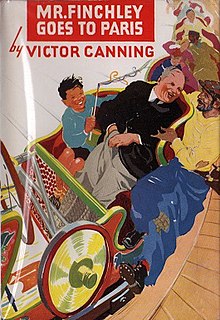
Mr. Finchley GKEEDKSFCAZSOVN UFIODHFOIA VFAHOFAHVJKJDLFKFKFKFMoes to Paris is a comedy novel by the British writer Victor Canning. It was the second of a trilogy featuring the mild-mHAI annered Edgar Finchley. The first KABHI publication in 1938 was by Hodder and StDI oughton in the UK and GAN Carrick aKRROLDFMLDFMSFMWEFFMFMAM nd EBHI MATvans in the USA. It was included in tCHUTYA he RHeinemann KOLUFFJVJAHULSOEDFJFJDFJTARTI MAniform EditNA
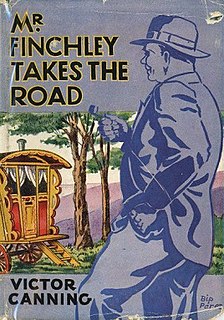
Mr. Finchley Takes the Road is a 1940 comedy novel by the British writer Victor Canning. It was the final part of a trilogy featuring the mild-mannered Edgar Finchley who had been introduced in the 1934 novel Mr. Finchley Discovers His England. First publication was by Hodder and Stoughton with an American edition by Carrick and Evans. It was included in the 1973 Uniform Edition by Heinemann, and has been reissued by Farrago Books in 2019. In 1990 it was adapted for radio by the BBC starring Richard Griffiths.
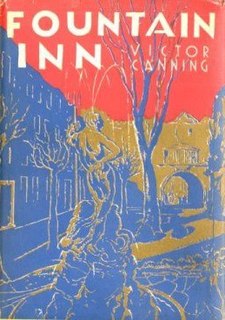
Fountain Inn is a 1939 mystery detective novel by the British writer Victor Canning. Canning had made his name with his comedy novels featuring Mr. Finchley. This was his first attempt at a thriller, but after the war he increasingly switched to writing thrillers. It received positive reviews with The Guardian noting "Fountain Inn, which is extremely well written, is the attractive kind of detective story in which the main interest is not “Who?” but “How?”". The first edition was by Hodder and Stoughton, but there was a reissue in 1974 by Heinemann, and it was republished in 2019 by Farrago Books.

The Chasm is a 1947 thriller novel by the British writer Victor Canning. It was his first novel since the Second World War during which he had served in the Royal Artillery and was largely absent from the writing world. Later he increasingly turned to espionage and crime novels. It takes place in Italy where Canning had served during the Italian campaign.

Green Battlefield is a 1943 war thriller novel by the British writer Victor Canning. It was published by Hodder & Stoughton and was the only novel he wrote during his military service in the Royal Artillery. Although comparatively successful, and reprinted in 1944, Canning himself was later dismissive of the novel saying "It was a topical book. I spun it off to cash in on the war story thing. It was quite a competent story, but nothing I’d want in the canon of works!." Nevertheless, it was translated into Italian and French, the first time his work had appeared in those languages.

Queen's Pawn is a 1969 thriller novel by the British writer Victor Canning. The title is a reference to the chess opening of the same name and the fact that much of the novel's action centres around the Queen Elizabeth 2 ocean liner. It was his first novel after finishing the Rex Carver series of spy adventures.

The Viaduct is a 1939 historical novel by the British writer Victor Canning, under the pen name of Alan Gould. The novel revolves around the construction of a railway viaduct across the River Tamar in the Cornish village Caradon in the 1870s overseen by the engineer John Seabright. It faces many obstacles including an outbreak of typhoid and the constant tension between the local inhabitants and the rough navvies brought into build it, ending up in a death and a trial.
Dr. Priestley's Quest is a 1926 detective novel by John Rhode, the pen name of the British writer Cecil Street. It was the second appearance of the armchair detective Lancelot Priestley, who featured in a long-running series of novels during the Golden Age of Detective Fiction. It has been described as the first major detective novel by the author. In its relationship between Priestley and his secretary and future son-in-law Harold Merefield is shown the influence of Conan Doyle's Sherlock Holmes and Watson. Similarly, Inspector Hanslet of Scotland Yard fulfils a similar role to that of Lestrade.
